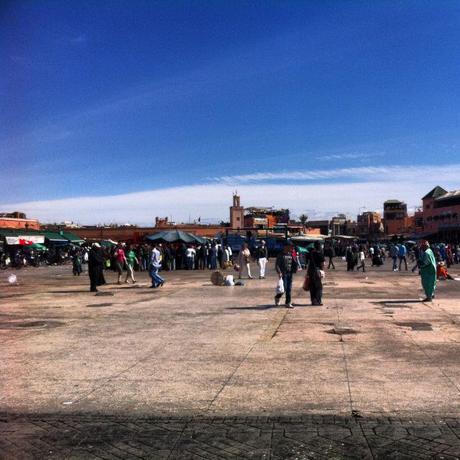
Several months into dating, Mustapha and I were sitting in a cafe that overlooks Jemaa El Fna. We were chatting about our lives, our families, our parents…and he casually mentioned that his dad worked as a storyteller in Jemaa El Fna. Coke spurting out of nose ensued. “What?!!! How has this never come up before?? That’s awesome!!!” My enthusiasm, of course, was regarded with that look I’ve gotten to know so well here– when I get excited about something in Moroccan culture that is not, in fact, worth a second thought to my Moroccan brethren. Other such moments include seeing the mountains on a clear day (“Sarah, those are there all the time….”), having a really delicious meal (“This ol’ thing? It only took me three hours to make. Stop fussing.”), or hearing that someone served as Brad Pitt’s translator during a movie filming in Morocco (“Yeah, whatever, he was pretty boring.”). Celebrities in particular elicit very little excitement from, well, pretty much everyone except me; apparently here, celebrities really can just sit at a cafe and carry on a normal life without being bothered by anyone. Having a legitimately famous father also falls under this category.
Ahmed Ezzarghani, also known as “Hajj”, is quite a guy. At the age of 7, he left his home and invested in a small cafe cart. For my western audiences, this is not the equivalent of a hip food cart– this is literally a put of coffee strapped to a heater that you carry around and pour into cups for people waiting at bus stops. Travel was a perk of the job, allowing little Hajj to travel around the Marrakech area to all of the weekly markets and sell his coffee. This is where the magic happened.
Being around the souk crowd, Hajj obviously met a ton of people. He also soaked up the stories of his country. Anecdotes, proverbs, religious texts, historical battles, traditional fables– it all intrigued him so much that he began to seek out the professional storytellers to learn more. At this time– the 1940s and 1950s– and probably through the 1980s, storytellers were abundant and well-loved in Morocco. They regaled audiences with their tales, embodying a spirit more aligned with theater than anything else out of today’s world. These were the entertainers of the day, drawing large audiences for hours in public squares and street corners. The tradition was rich, the crowds were ever-expanding, and these storytellers traveled to almost every imaginable city in Morocco.
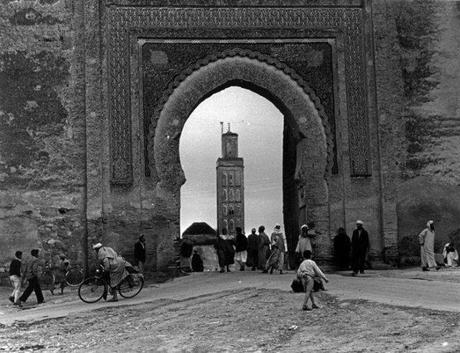
This is Meknes in the 1950s. It has nothing to do with this story except that it’s Morocco in the 1950s.
Hajj joined them. He spent years pouring over traditional texts and engaging in the nuances of each story. I wouldn’t say that he learned or memorized them as much as he embodied them, taking the poetry, rhythm, and story line of each tale and creating his own unique piece. There are several volumes of books that storytellers would learn at this time– many of the books have origins in the Middle East, but some of them are purely Moroccan as well. Hajj traveled to Rabat and then onto Fes, where he became famous for his stories. Ministers of the king would invite him to their houses , crowds would gather en mass every night to listen and watch the Hajj. After decades in Fes, it was time to return to his home– Marrakech– and take over Jemaa El Fna.
Years passed and Jemaa El Fna shifted. It became louder, busier, more touristy. Traditional storytellers found themselves shouting their stories to be heard, and crowds slowly decreased as their attentions found TV, cellphones, and the internet. Newer “storytellers” coming into Jemaa El Fna didn’t engage in the same brand of historic, religious, and artistic stories, favoring instead the instantaneous pleasure of dirty jokes and slapstick humor. Hajj and his fellow artists began to leave Jemaa El Fna in favor of other work and, in some cases, retirement.
The Hajj I met 2 years ago was comfortably enjoying his time running a cafe in town. For a man in his 70s, he is still energetic and conniving, repeating the day’s events to his family with the same facial expressions and hand gestures that I’m sure he employed in Jemaa El Fna. He’s the kind of guy where, when you learn that he was a master storyteller, everything suddenly makes a little more sense. Sometimes, in fact, gaining this tidbit of knowledge helps get a force in motion.
My dear friend Melissa stopped over for L’3id this year. She met the Hajj and, upon hearing his story, put together a quick proposal: storytelling and teaching at the almost-newly-opened Cafe Clock in Marrakech. It would be a celebration of the tradition, with Hajj performing his stories, and a preservation/ revitalization at the same time, enlisting several young Moroccans to study under Hajj and absorb the trade. Melissa worked tirelessly to recruit several young Moroccans with extensive language arsenals and put them together with the Hajj. The goal? In 6 weeks, these “apprentices” would learn traditional stories and storytelling from the Hajj and would perform the traditional hikayat in English as an opening event for the Marrakech Biennale. In other words, high stakes for all involved.
The three original apprentices– Oussama, Sarah, and Malika– committed hard from the beginning. They spent every Sunday with the Hajj for several hours, and then requested additional meetings on Thursday mornings to practice their English renditions of traditional stories. Oussama chose a story about how a fisherman’s strange catch acts as a catalyst for revenge; Sarah selected the tale about the gherreb, a water-seller in Marrakech, and how his honesty in the face of jealousy lead to a great reward; Malika went out on a limb and told a story about how women are trickier than men. For weeks, these three worked to perfect not only their English renditions of the stories, but also their body language and storytelling.
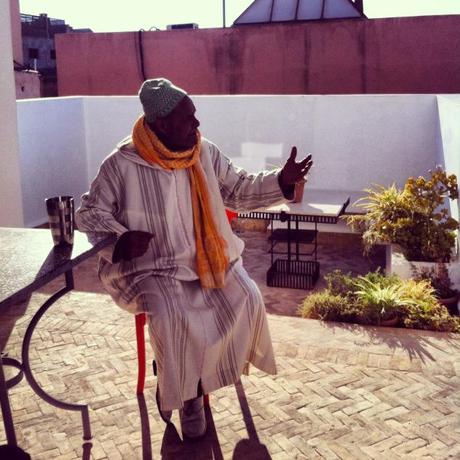
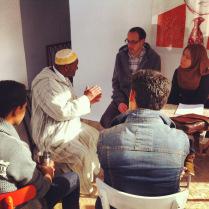
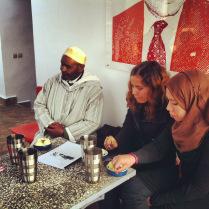
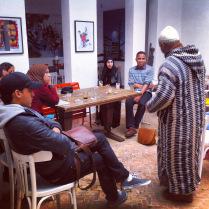
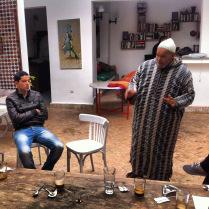
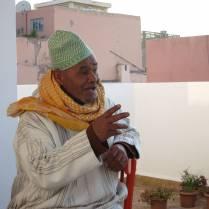
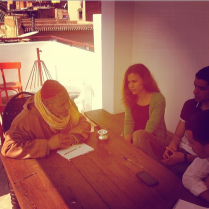
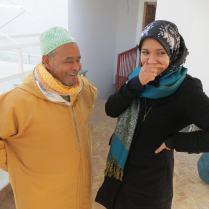
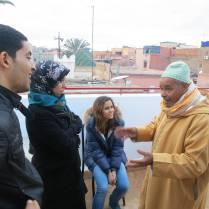
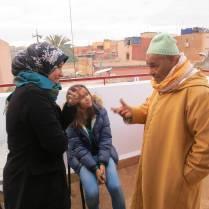
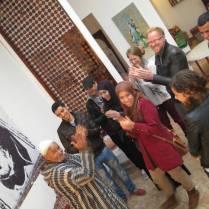
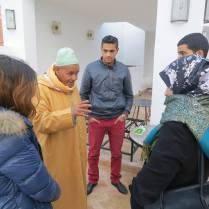
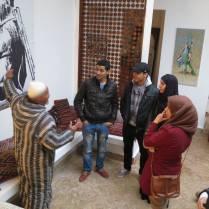
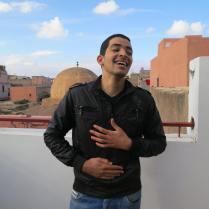
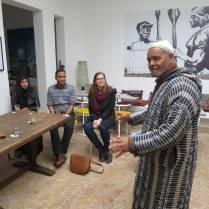
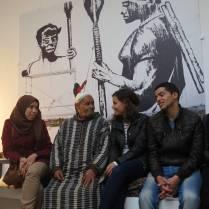
This past Thursday, the apprentices and Hajj got together for Cafe Clock’s opening event. Richard Hamilton, the author of The Last Storytellers, was present as well for opening remarks and book signings. In his research years ago, he felt a certain pessimism with the dying art of storytelling, quoting “when a storyteller dies, a library burns.” This statement accurately measures the depth of loss that Marrakech and Morocco are facing as they turns away from the art of storytelling. Once Hajj took the stage, I think it resonated with everyone in attendance just how much we stand to lose by not preserving the tradition. The portion of the audience without Arabic skills remained as enraptured as those who could understand the Hajj. It was truly beautiful watching the master shape and mold his craft.
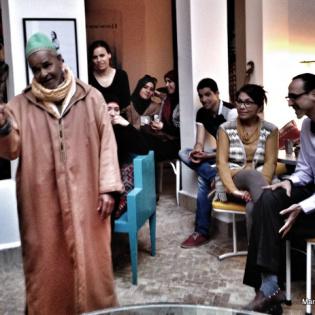
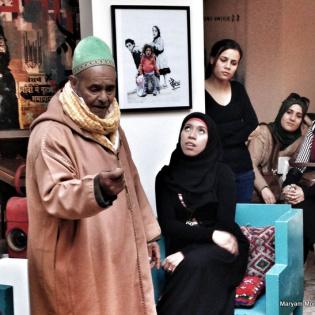
The apprentices shone as well. Malika, Oussama, and Sarah– in that order– each told the best version of their respective stories that I’ve heard thus far.
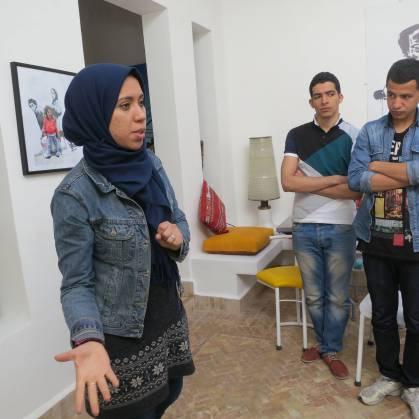
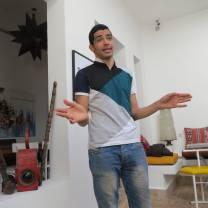
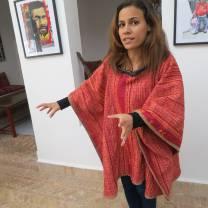
Hajj closed with another story of his own, and, when a gnaoua band took the stage after him, he transitioned from song to dance.
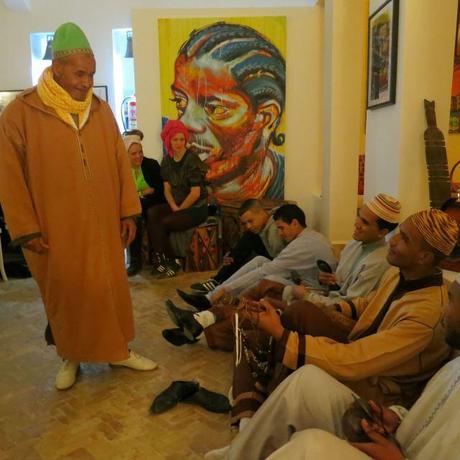
As a step for storytelling preservation, this is a significant one. The problems faced by Morocco’s storytellers are rendered null and void in Cafe Clock Marrakech, where those who come are seeking out the tradition. Cell phones, TVs, and other distractions are put on hold in order to witness living history in all of its energetic wonder. It’s one of the best “youth development” projects I’ve been involved with over the past 2.5 years. If you’re in Marrakech and are wanting to check Hajj and the apprentices out for yourself, they will be performing every Thursday from 5-7pm at Cafe Clock.
